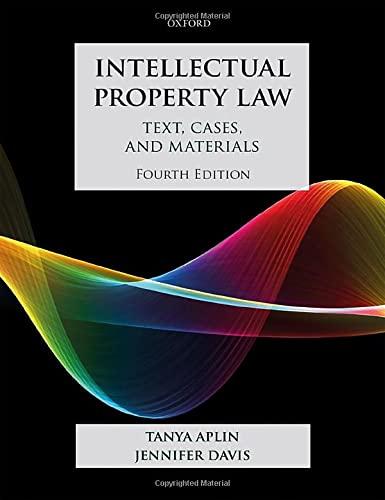Question
Hi , I need help understanding this work sheet : 1. In 2004, the Watergate Hotel in Washington, D.C., obtained a loan from PB Capital.
Hi , I need help understanding this work sheet :
1. In 2004, the Watergate Hotel in Washington, D.C., obtained a loan from PB Capital. At this time, hotel employees were represented by a union. Under a collective bargaining agreement, the hotel agreed to make contributions to an employees' pension fund run by the union. In 2007, the hotel was closed due to poor business, although the owner stated that the hotel would reopen in 2010. Despite this expectation, PB Capitalwhich was still owed $40 million by the hotel ownerinstituted foreclosure proceedings. At the foreclosure sale, PB Capital bought the hotel and reopened it under new management and with a new workforce. The union sued PB Capital, contending that it should pay $637,855 owed by the previous owner into the employees' pension fund. Should PB Capital, as the hotel's new owner, have to incur the previous owner's obligation to pay into the pension fund under the theory of successor liability? Why or why not?
This case is based on ? of one company by another.
- an asset purchase
- a merger
a consolidation
- a reorganization
2.Select
Watergate Hotel
PB Capital
Item 1
is the purchaser.
3.Select
Watergate Hotel
PB Capital
Item 1
is the company whose assets are being purchased.
4. PB Capital purchased the Watergate Hotel through aSelect
stock sale
foreclosure sale
private auction
Item 1
.
5. When PB Capital reopened the hotel, it did so with management and a workforceSelect
previously employed by Watergate
newly hired by PB Capital
Item 1
.
6. Did PB Capital contractually assume Watergate's pension liabilities?Select
Yes
No
Item 1
7. Did PB Capital merge or consolidate with Watergate?Select
Yes
No
Item 1
8. Did PB Capital purchase the hotel assets to fraudulently escape pension liability?Select
Yes
No
Item 1
9. Generally, a corporation that purchases theSelect
assets
stock
control
Item 1
of a second corporationSelect
does
does not
Item 2
assume the debts and liabilities of the second corporation.
10. The union's argument is that PB CapitalSelect
assumed
did not assume
Item 1
pension liabilities when it purchased the hotel assets.
11. The union will likelySelect
win
lose
Item 1
its argument based on the fact that PB Capital did not contractually agree to assume pension liabilities, used separate employees, did not conduct a merger or consolidation, and did not fraudulently try to escape liability.
Step by Step Solution
There are 3 Steps involved in it
Step: 1

Get Instant Access to Expert-Tailored Solutions
See step-by-step solutions with expert insights and AI powered tools for academic success
Step: 2

Step: 3

Ace Your Homework with AI
Get the answers you need in no time with our AI-driven, step-by-step assistance
Get Started


